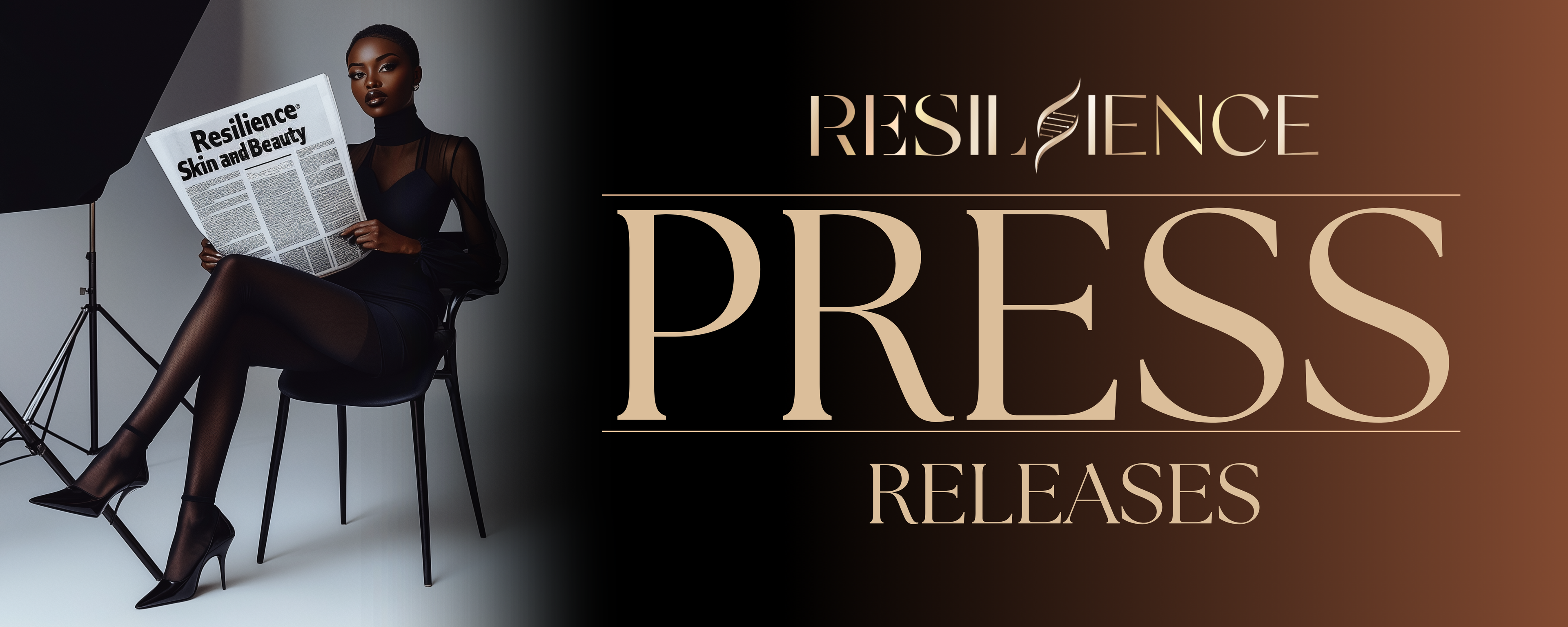
As Seen On










October 3rd, 2025
From the Script
Podcast hosted by Armourie
September 16, 2025
Hype Hair
Written by Mo Clark

Resilience skin and beauty on hypehair.com
From Transplant to Transformation: Omni McCluney Redefines Beauty, Resilience, and Hair Health
After surviving a double lung transplant due to a rare autoimmune disease, Omni didn’t let her battle define her—instead, she turned it into her purpose. In a world where beauty is often filtered and curated, Omni’s story is refreshingly real. Her journey from patient to practitioner is not only inspiring but also groundbreaking, proving that expertise fueled by lived experience creates the most impactful kind of care.
Written by Mo Clark
Article Chapters
When you first meet Omni McCluney, her presence feels like a masterclass in grace, strength, and quiet power.
A Houston-based Dermatology Physician Assistant with over seven years of experience, Omni is far more than her white coat. She is a survivor, a healer, and a walking testament to resilience.
After surviving a double lung transplant due to a rare autoimmune disease, Omni didn’t let her battle define her—instead, she turned it into her purpose. The disease that attacked her lungs also caused severe skin complications, sparking her passion to help others reclaim confidence in their own skin and hair. Today, Omni blends science with empathy, offering patients not only expert treatment but also an understanding heart.
“Hair loss and skin sensitivity aren’t just cosmetic issues,” Omni shares. “They affect how people see themselves, how they show up in the world, and how they feel about their identity. I’ve been there, so I know the weight it carries.”
In a world where beauty is often filtered and curated, Omni’s story is refreshingly real. Her journey from patient to practitioner is not only inspiring but also groundbreaking - proving that expertise fueled by lived experience creates the most impactful kind of care.
Hair Loss Uncovered: Omni Answers Your Top Questions
We sat down with Omni to talk about hair health, common causes of hair loss, and how to protect your crown with confidence and care.
What are the most common causes of sudden hair loss?
“There are many reasons someone might experience hair loss,” Omni explains. “Genetics, hormonal changes, medical illnesses, medications, nutritional deficiencies, stress, hairstyles, and even aging. The key is identifying the root cause.”
How can you tell the difference between normal shedding and a hair loss condition?
“Normal shedding means losing 50–100 strands a day, often with a little white bulb at the end—that’s just part of the hair growth cycle. But when you notice thinning density, scalp irritation, or clumps of hair falling out, that’s when it’s time to seek help.”
Does diet really play a role in hair thinning or breakage?
“Absolutely. Hair is made of keratin, a protein. Without enough protein, hair becomes weak and breaks. Deficiencies in iron, zinc, vitamin C, B12, folate, biotin, and fatty acids can all impact growth, strength, and repair.”
What treatments are available for male or female pattern baldness?
“Options like minoxidil (Rogaine), finasteride, and other compounds have been proven effective. Some work topically, while others are systemic and prescription-only.”
Can stress really cause hair loss?
“Yes! Telogen Effluvium is when stress triggers more hairs than usual to enter the resting phase, leading to shedding. Cortisol imbalance disrupts hair growth. Usually, it begins 2–3 months after the trigger and lasts about 3 months.”
Are over-the-counter hair growth products effective?
“Rogaine is effective, but many patients prefer prescription treatments because they can deliver results more quickly.”
How do scalp conditions like dandruff or psoriasis affect hair health?
“These inflammatory conditions can disrupt follicles, slowing growth. If untreated, long-term inflammation may cause scarring, which can permanently affect density.”
Is it possible to regrow hair after scarring alopecia?
“Unfortunately, no. Once a follicle is replaced with scar tissue, it cannot regenerate.”
Do tight hairstyles really cause permanent hair loss?
“Yes. Styles with excessive pulling and tension, like braids or ponytails, can lead to traction alopecia. If repeated over years, it can result in permanent scarring.”
Beyond the Science: Beauty with Purpose
Omni is living proof that beauty is not just skin deep—it’s rooted in resilience, science, and purpose. By merging her medical expertise with her lived experience, she’s not only changing the way we view dermatology but also reshaping the conversations around hair and skin health in communities that need it most.
“Every scar tells a story, but so does every strand,” Omni reminds us. “Taking care of your hair and skin is self-love, and self-love is healing.”
Fierce. Fearless. Flourishing. Omni McCluney is showing us all that beauty, like resilience, grows stronger when nurtured with purpose.
Learn more about Ommi McCluney’s work and products here.
Visit McCluney’s website https://www.resilienceskincare.com or Facebook page https://www.facebook.com/resilienceskinandbeauty.
August 16, 2025
BlackDoctor.org
Written by Jasmine Smith
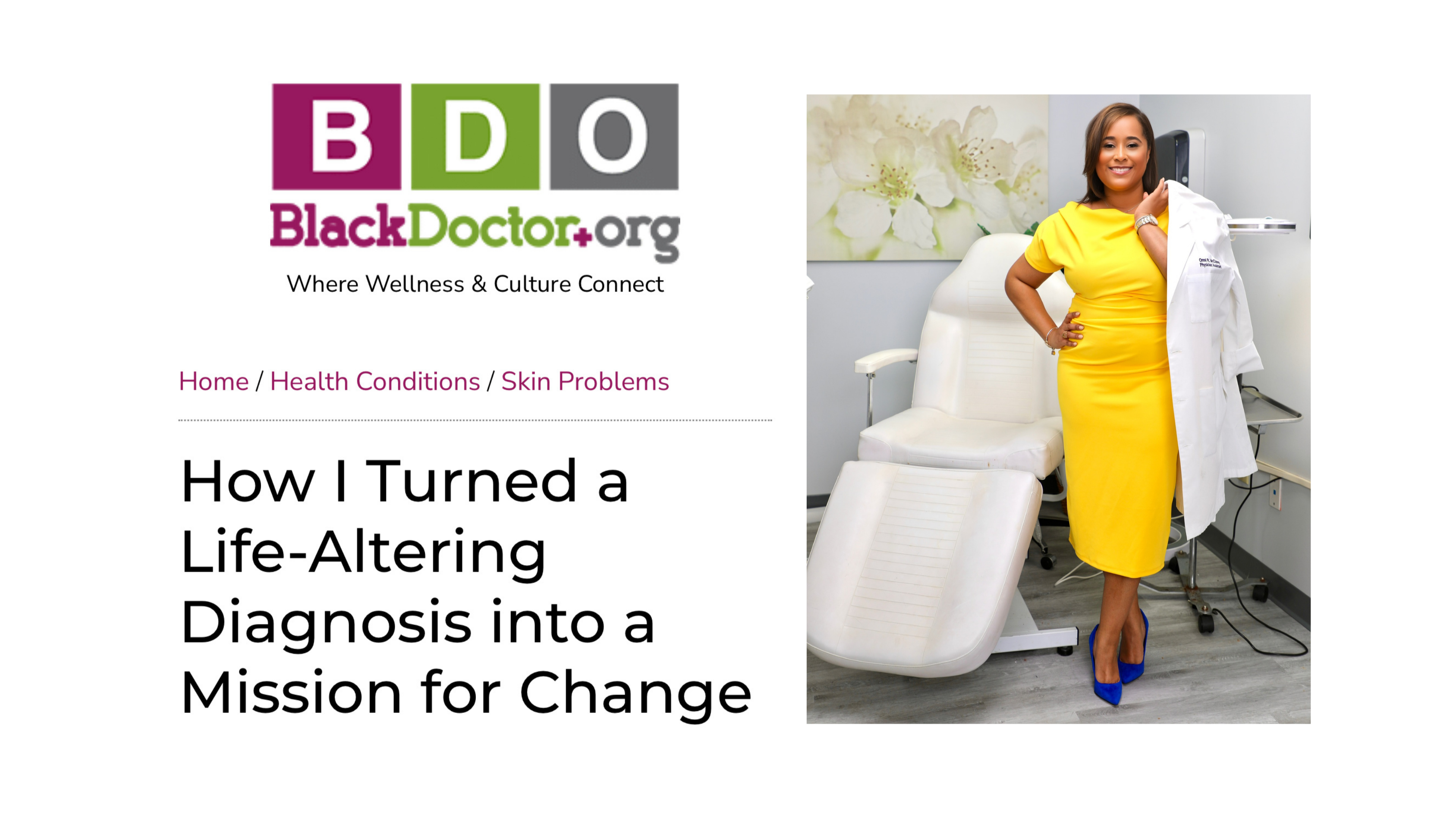
Resilience skin and beauty on BlckDoctor.org
How I Turned a Life-Altering Diagnosis into a Mission for Change
This powerful feature article chronicles the remarkable journey of Omni McCluney, PA-C Dermatologist, from a life-threatening medical crisis to founding a skincare company dedicated to melanin-rich skin. The story follows Omni's miraculous survival after being given one week to live, her battle with Antisynthetase syndrome requiring a double lung transplant, and the unexpected challenge of medication-induced skin sensitivities during recovery. When her professional dermatology expertise couldn't solve her own skin struggles, Omni realized she wasn't alone in facing these challenges and transformed her personal struggle into purpose by creating Resilience Skin and Beauty. This inspiring story beautifully captures how personal challenges can become powerful catalysts for positive change in underserved communities.
Written by Jasmine Smith
Article Chapters
How I Turned a Life-Altering Diagnosis into a Mission for Change
In 2015, Ommi McCluney’s life took a dramatic and unexpected turn. An athlete who once rode her bike 60 miles on weekends and played college basketball, she suddenly found herself unable to climb three flights of stairs without gasping for air.
Doctors diagnosed her with anti-synthetase syndrome, a rare autoimmune condition that can cause severe muscle pain, skin inflammation, and—most critically—lung fibrosis. In her case, the disease triggered pulmonary hypertension, which rapidly progressed to life-threatening pulmonary fibrosis.
By January 2020, McCluney’s oxygen levels were dangerously low. She collapsed during a trip to the Grand Canyon and had to be airlifted to Phoenix. There, she was told bluntly: without a double lung transplant, she wouldn’t survive much longer.
"My oxygen levels were around 75–80% when normal is 90% and above,” she tells BlackDoctor.org.
Back home in Houston, she was placed on the transplant list in April 2020. Just five months later—on September 15, 2020—she received her new lungs.
When Medicine and Personal Struggle Collide
Shortly after starting her career as a physician assistant in dermatology, McCluney began noticing dramatic changes in her skin.
“I was in the heart of my illness, using oxygen daily and on high doses of prednisone. Prednisone kept inflammation down so I could breathe, but it caused severe acne, weight gain, and high glucose,” she shares. “I had very severe acne and hyperpigmentation. As a dermatologist, I was treating patients to help them look better, but I couldn’t treat myself. The medications I prescribed for patients would burn and irritate my own skin,” she adds.
The antibiotics she took also made her skin burn and react to sunlight.
Rather than accept that as her new normal, McCluney decided to innovate. She created Resilience Skincare, starting with a gentle retinol cream designed for people with sensitive skin or medical conditions that make traditional retinol products too harsh.
More Than Beauty: A Mission for Inclusive Care
Resilience Skincare is more than a product line; it’s a statement of advocacy. McCluney is committed to developing affordable, effective skincare for people with chronic illnesses, sensitive skin, and darker skin tones, communities often overlooked by mainstream beauty brands.
“A lot of skincare brands sell to big companies and formulas change. I’m promising myself not to do that. My products will always cater to people with sensitivities and melanated skin,” she explains.
Her future plans include expanding the line with a safe facial cleanser and sunscreen by the end of the year—all tailored for sensitive, melanated skin.
Breaking Down Myths About Skin Health
In her clinical work, McCluney also pushes back against common misconceptions:
- Dandruff is normal. “Dandruff is not normal. It’s a treatable condition that may be connected to gut health, medications, or other medical issues.”
- Black people don’t need sunscreen. “Melanin protects against some cancers but not free radical damage, fine lines, wrinkles, hyperpigmentation, or melasma.”
- All hair loss is alopecia. “Not all hair loss is alopecia. It could be vitamin deficiencies, medical illness, or tension from hairstyles.”
- Dry, flaky skin is just ‘sensitive skin.’ “It could be seborrheic dermatitis — an overproduction of yeast.”
Her approach always connects skin symptoms to overall health.
“If your skin shows signs of inflammation — rashes, bumps, dryness, flakiness, dandruff, hair thinning — see a dermatologist. The skin is the largest organ, and problems often signal something going on internally,” she advises. “In the Black community, we have the highest rates of autoimmune conditions. When patients present with new, unexplained skin changes, I’m always thinking about possible underlying conditions.”
Confidence, Care, and Community
For those struggling with skin issues that affect their self-esteem, McCluney offers both hope and practical advice.
“There’s always a solution. As long as you have breath in your body, you can fix what you want to change about yourself — with the right guidance and knowledge. TikTok is not always the answer; you need credible sources,” she says.
Through her clinic in Houston—Moore Dermatology, where over 90 percent of her patients are Black—she provides both in-person and online consultations, even offering free skin analyses through her website.
“God gave me another life,” McCluney says. “My purpose is to use that gift to help others—through medicine, advocacy, and education.”
Looking Ahead
McCluney’s next chapter is about growth, advocacy, and leadership. She hopes to get Resilience Skincare into major retailers, expand her product line, and eventually step into a larger advocacy role—pushing for more inclusive policies in medicine and skincare.
“I want to make sure our communities are seen, heard, and cared for—both in the clinic and on the shelves,” she concludes.
Learn more about Ommi McCluney’s work and products here.
Visit McCluney’s website https://www.resilienceskincare.com or Facebook page https://www.facebook.com/resilienceskinandbeauty.
June 3rd, 2025
Fox Soul
Fox 26 houston Chattin with chelsea
Resilience Skin and Beauty on chattin' with chealsea
Miracle Medical Inspirations
Streamed live on FOX 26 HOUSTON Jun 3, 2025
From a double lung transplant to multiple brain surgeries, two women share their extraordinary medical stories that inspired them to build businesses to help other women. Join Chelsea, Omni McCluney, & Nia Renee, as these 3-powerhouse women chat about their life-changing medical miracles that led to inspiration.
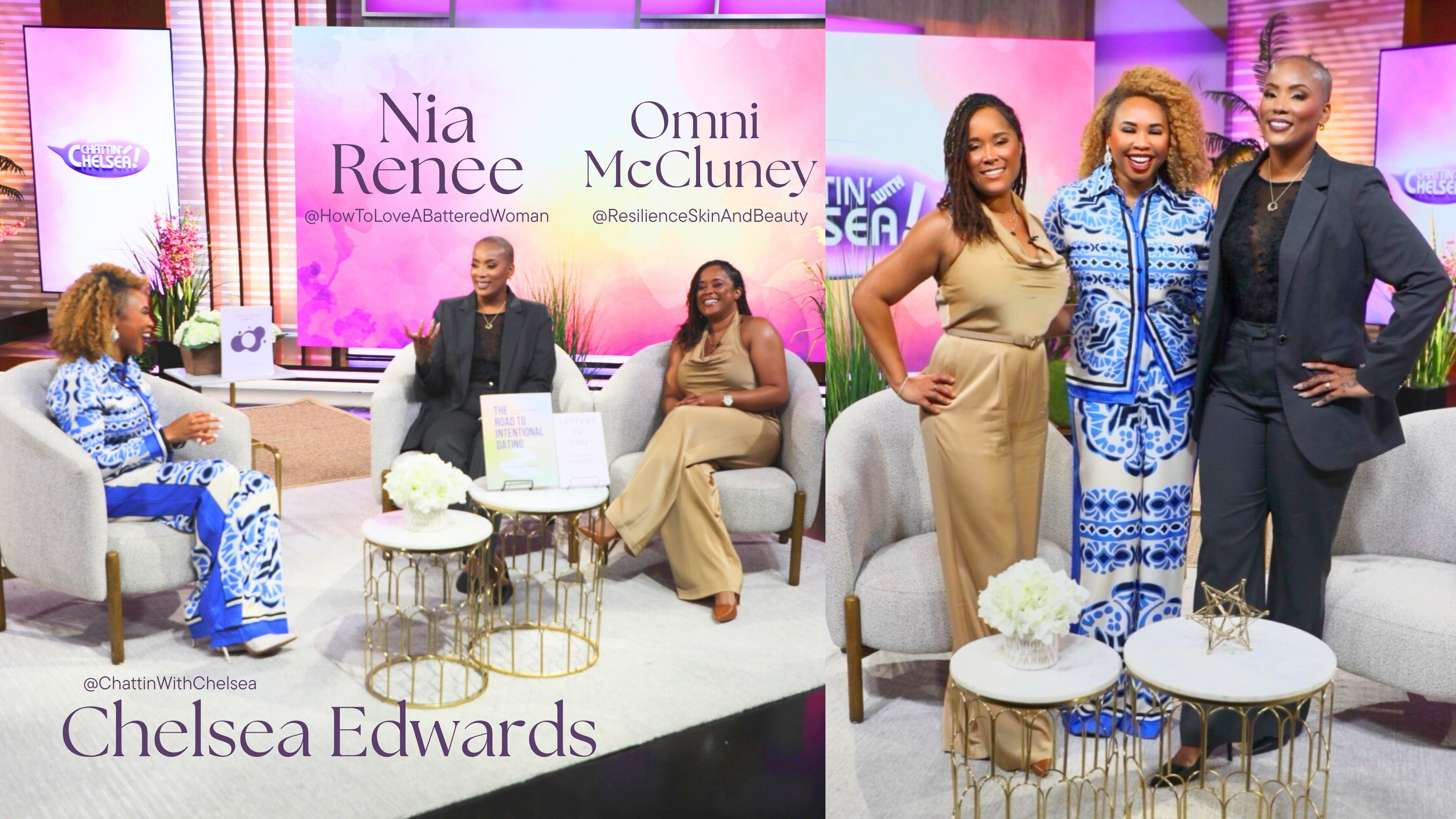
June 20th, 2025
The Baltimore Times
Written by Andrea Blackstone
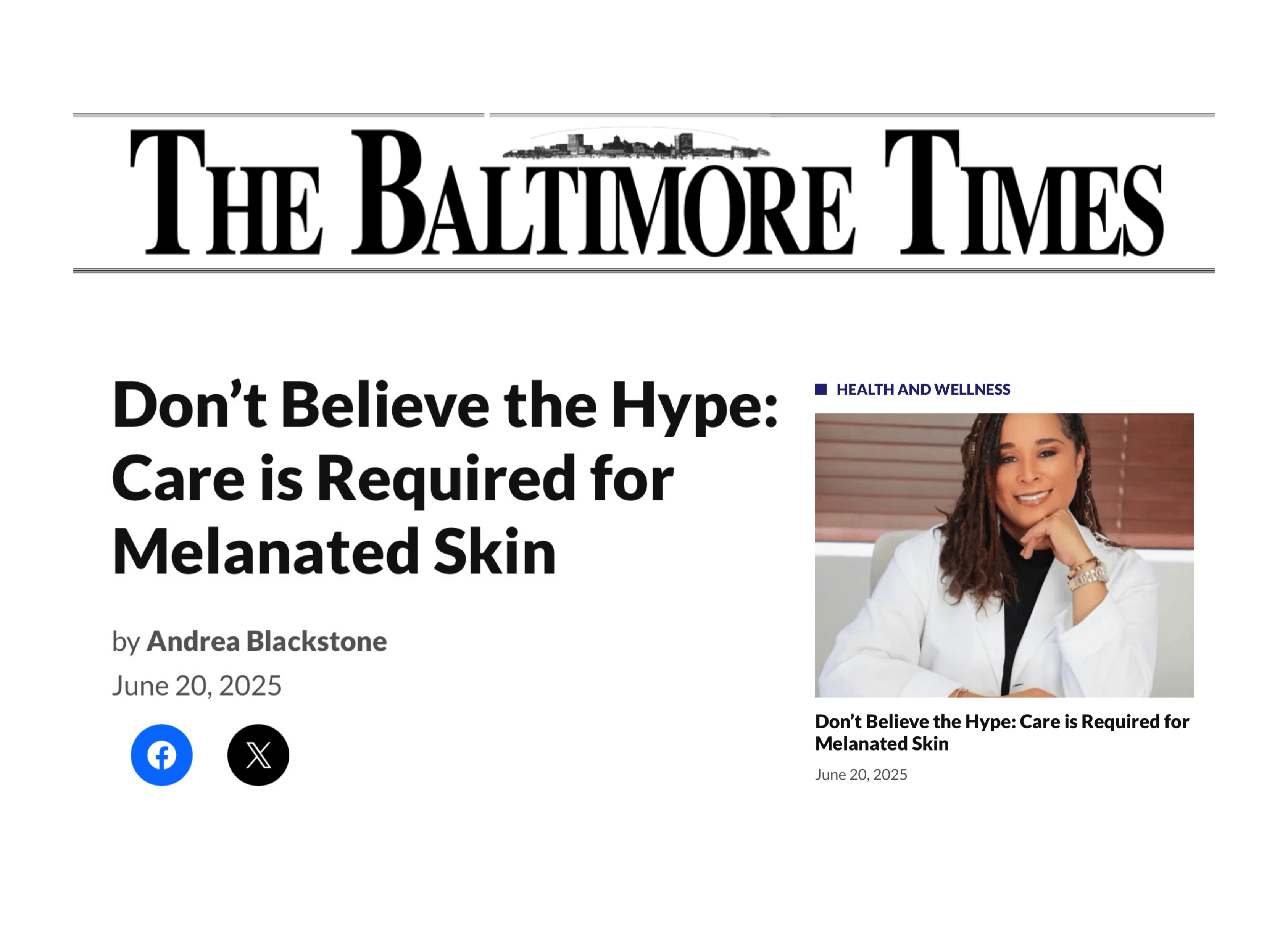
Resilience skin and beauty on the Baltimore times
Don't Believe the Hype: Care is Required for Melanated Skin
Dermatology PA-C Omni McCluney emphasizes that melanin-rich skin still requires consistent care—sun exposure, heat, and inflammation can cause damage and hyperpigmentation even when visible burning isn’t obvious. The article outlines practical soothing tips, including cool compresses, fragrance-free moisturizers, and gentle bathing, as essential steps to support healing and maintain skin resilience.
Written by Andrea Blackstone
Article Chapters
Do not let the “Black don’t crack” adage steer you in the wrong direction.
Do not let the “Black don’t crack” adage steer you in the wrong direction. While many African Americans seem to age more gracefully than their counterparts, Omni McCluney, a dermatology physician assistant and founder/CEO of Resilience Skin and Beauty, provides expert food for thought. McCluney offers general dermatology services, surgical procedures, cosmetic services and more. She created Resilience Skin and Beauty, a skincare line tailored for sensitive, medically affected skin, especially for people of color.
Prevent Sunburn
McCluney explains that melanin absorbs UV rays, thereby reducing the risk of DNA damage. However, African Americans are still susceptible to sunburned skin. Prolonged exposure to sunlight, especially during peak hours (10 a.m.-4 p.m.), can overwhelm melanin’s protection and cause burns.
Sunburns in darker skin tones may appear as skin tenderness, dryness, peeling, flaking, itchiness, tightness, and darkening of the skin, instead of visible redness.
“In severe cases, there may be blistering. This damage to melanin-rich skin can increase the risk of skin cancers if these conditions are repeated. Sun exposure can also cause hyperpigmentation, uneven skin tone, dark spots, and melasma, and it can even induce skin conditions like eczema and trigger lupus flare-ups and lupus skin disorders. UV damage also contributes to premature aging,” said McCluney.
Guard Against Skin Damage
McCluney suggests that parents should make sure their children wear sunscreen daily to protect their skin from the UV rays.
“It’s also important that parents limit their child’s exposure to the sun by allowing their children outside during dusk and dawn, limiting how long the child is in the sun during peak hours, wearing protective garments, and re-applying sunscreen every two hours,” she added.
Wearing large-brimmed hats during sunny or hot weather can help limit the exposure of UV rays from the sun for people of all ages.
“It can assist in protecting the face, neck, and upper shoulders. It’s not 100% effective, and sunscreen still needs to be applied, but it does add some layer of protection if a person plans on being in the sun for a long duration of time,” said McCluney.
How to Care for Sunburned Skin
Act if your skin gets sunburned. McCluney suggests taking these measures:
1. Soothe the skin. Apply cold compresses to the affected areas for 10-15 minutes.
2. It is preferable to take cool showers.
3. Use fragrance-free moisturizers immediately after bathing.
4. Let sunburned skin heal.
“Emollients like aloe vera gel, shea butter, and ceramide creams like Eucerin will help with the healing of the skin,” McCluney stated.
She further explained that once skin is healed, to further correct the pigmentation, Vitamin C creams may be used to brighten it. Daily use of SPF prevents additional skin damage.
Skin Cancer Risks
McCluney stated that African Americans are still at risk for skin cancers despite the amount of protection from the increased melanin.
“Acral lentiginous are the most common melanomas in the African-American communities. These hyper-pigmented lesions will appear mostly on the palms of the hands, soles of the feet, and in the nail bed. These lesions are not sun-related and occur in less visible areas, which often leads to late diagnosis causing higher mortality (death) rates,” McCluney mentioned.
Squamous cell carcinomas are also more common than basal cell carcinomas in African Americans.
“Because skin cancers in African Americans appear as dark patches, non-healing sores, or pigmented streaks in nails, which may be mistaken as benign conditions, the delayed diagnosis contributes to worse outcomes,” McCluney explained.
Additionally, SPF sunscreen helps to prevent non-melanoma lesions and photoaging, but it does not prevent acral lentiginous melanoma.
“Self-exams, especially of the palms of the hands, soles of the feet, nails, and scarred areas, and yearly visits with a dermatologist for skin exams are essential for early detection,” McCluney stated.
Skincare Matters
McCluney informs that men have more active oil glands, which makes them more prone to acne and clogged pores.
“Shaving is a form of daily exfoliation and irritation that may cause ingrown hairs and hyperpigmentation, especially in men of color. Skin care routines for men will help reduce inflammation and support the skin barrier recovery,” McCluney stated.
Visit McCluney’s website https://www.resilienceskincare.com or Facebook page https://www.facebook.com/resilienceskinandbeauty.
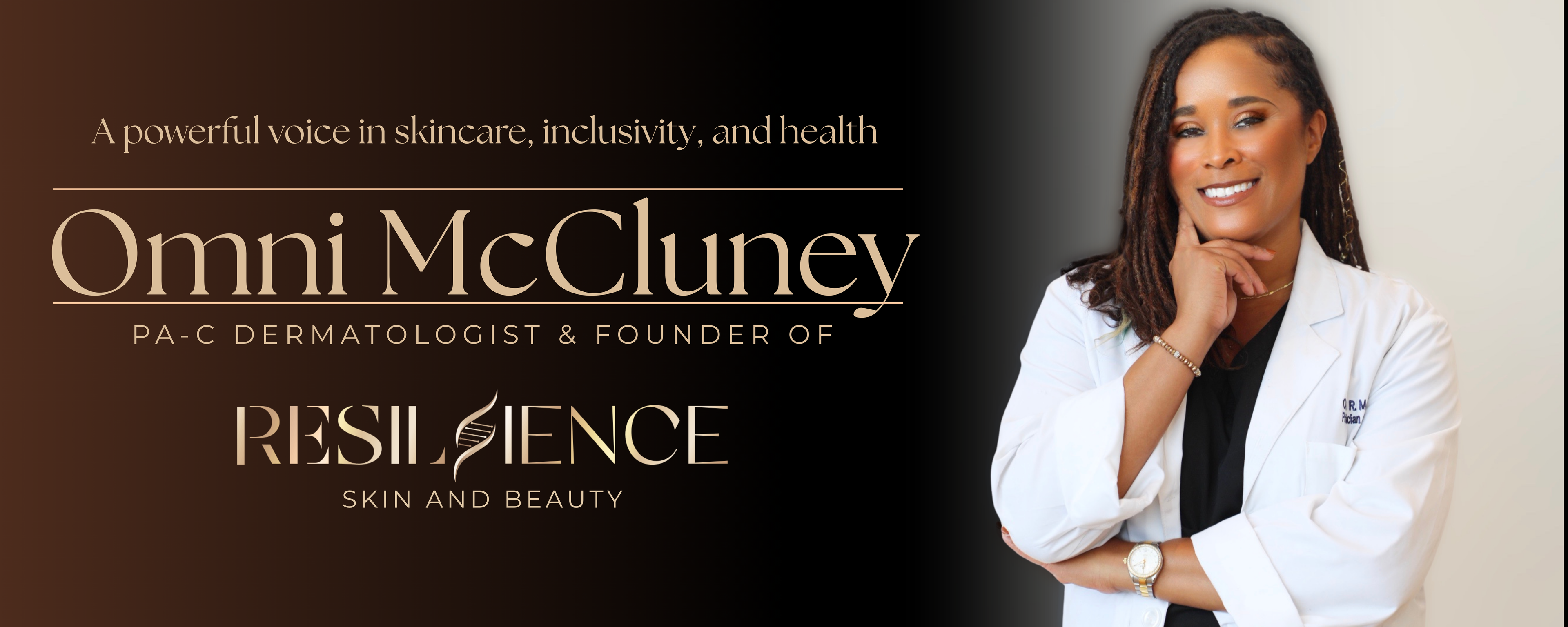
Resilience Skin and Beauty
Engagements
Omni McCluney, PA-C Dermatology Specialist and Founder of Resilience Skin & Beauty, brings expert knowledge and authentic story of STRENGTH & RESILIENCE to every stage.
During media interviews, keynote addresses, panel discussions, or collaborations, she delivers impactful insights that educate, empower, and inspire.
Ready to build RESILIENCE with your audience?
Share your interest with our team and we'll provide more information.












